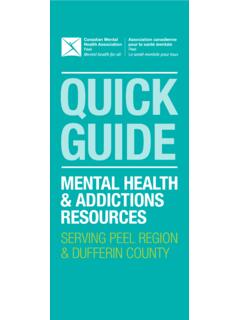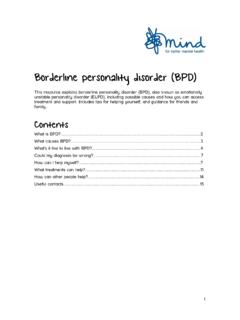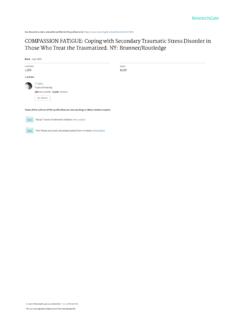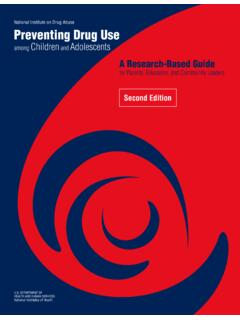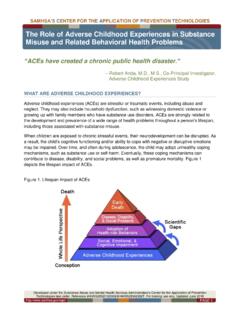Transcription of The Power of Family in Addiction Recovery
1 The Power of Family in Addiction RecoveryThe Power of Family in Addiction Recovery | 2 Table of ContentsAddiction is a Family Disease 4 The Family System: Unhealthy Behaviors 6 Four Ways to Get Involved in a Loved One s Treatment 11 When a Family Member Doesn t Want to Be Involved 16 Four Major Factors that Promote a Life of Recovery 18 Relapse is Possible 22 The Guiding Principles of Recovery 25 The Power of Family in Addiction Recovery | 3A large body of research demonstrates the positive impact the Family can have on a loved one's Recovery from Addiction . The National Institute on Drug Abuse highlights the many benefits of Family involvement in Recovery , including:1 Keeping your loved one engaged and motivated during treatment Learning about Addiction and its effects on the Family as well as understanding how treatment works and what to expect when it's complete Enabling Family members to voice feelings and concerns and ask questions about a loved one's Addiction Offering a loved one a high level of appropriate support after treatment Easing feelings of fear, anger, stress and confusion related to the Addiction The chance for Family members to develop skills and strategies to help a loved one stay on the path to Recovery Improvements in Family communication skills The opportunity to address any mental health issues within the Family system, such as depression or anxiety.
2 Which can hamper Family communication and contribute to relapseGetting involved in a loved one's Recovery improves the chances of long-term success while improving household function and Family members' own mental health. Here, we look at how Addiction affects the Family system, what involvement in treatment and post-treatment Recovery looks like, and how you can best support a loved one in the Recovery is a Family DiseaseThe Power of Family in Addiction Recovery | 5 The National Council on Alcoholism and Drug Dependence calls Addiction a Family That's because Addiction affects the entire Family system and the individuals who comprise it. Addiction puts Family members under a great deal of stress, disrupting routines and causing unsettling or even frightening experiences. As a result, Family members develop unhealthy coping strategies as they strive to maintain equilibrium in the household.
3 The Family unit becomes a fragile and dysfunctional system, and this often unwittingly contributes to the Addiction as the Family adopts destructive behaviors as a result of in the household are particularly affected by Addiction . Substance abuse in the home interrupts a child's normal development and leads to a higher risk for physical, mental and emotional health Children of an addicted parent often have difficulties in school and are more likely than their peers to have a learning disability, skip school or be expelled. They're also four times more likely than their counterparts to become addicted to alcohol or drugs themselves. The Family System:Unhealthy Behaviors The Power of Family in Addiction Recovery | 7 Families often cope with Addiction in unhealthy ways, such as by living in denial about the Addiction or by following behind their loved one, picking up pieces.
4 Their lives may revolve around the Addiction , whether it's at the root of endless arguments or it's an elephant in the and enabling behaviors are common among families living with Addiction . These types of behaviors can foster the Addiction as well as make Recovery very difficult for both the addicted loved one and the Family members. The Power of Family in Addiction Recovery | 8 CodependencyCodependency often results when someone has to adapt to dysfunction in the Family Codependent behaviors are learned thoughts, attitudes and behaviors that lead to neglecting your own needs and desires in favor of being obsessively concerned with a loved one's problems. Codependent behaviors include: Worrying constantly about your loved one's drug abuse and the consequences of the Addiction Living in denial about the Addiction , such as by lying to others about a loved one's substance abuse or avoiding contact with others because you don't want to have to make excuses Reacting violently or irrationally to events related to the Addiction Having very low self-esteem as a result of neglecting your own physical, spiritual and emotional needs as you focus solely on your loved one Aiming misplaced anger at others, such as the kids or pets Engaging in your own unhealthy behaviors that help you cope with reality, such as over-eating, excessive shopping or obsessive Internet use Basing your mood on that of your loved one The Power of Family in Addiction Recovery | 9 EnablingEnabling behaviors support a loved one's substance abuse by removing consequences.
5 Either out of love or fear. This makes it easy for a loved one to keep using, and it's unhealthy for the enabler, the addicted individual and the Family system. Enabling behaviors include: Using drugs or alcohol with a loved one to help keep trouble at bay Keeping your feelings inside in order to keep the peace with your loved one Accepting your loved one's justifications for substance abuse Working to protect your loved one's image by minimizing the consequences of the Addiction , such as by making excuses for them or taking care of their responsibilities Going out of your way to make everything at home appear normal to others Feeling guilty when you're unable to prevent natural consequences from affecting your addicted loved oneThe Power of Family in Addiction Recovery | 10 How Children May CopeChildren may develop their own set of unhealthy coping skills in response to Addiction in the household and the chaos and uncertainty it inevitably brings.
6 Many children blame themselves for a parent's substance abuse and may strive for perfection to avoid upsetting the delicate balance in the household. Conversely, they may withdraw for the same reason. Children who witness or fall victim to physical, emotional or sexual abuse may develop post-traumatic stress disorder and suffer from related nightmares, insomnia and flashbacks. They may withdraw socially due to a lack of social skills or the fear that someone may find out the truth, and they may suffer from anxiety born from an unstable living environment or from a deep-seated fear of losing their parent to the Addiction . Four Ways to Get Involvedin a Loved One's TreatmentThe Power of Family in Addiction Recovery | 12 Because Addiction is a Family disease, the whole Family is in Recovery when a loved one seeks help for an Addiction . Family involvement in the Recovery process is crucial for the best possible chance of successful long-term sobriety, because dysfunction in the household is a major relapse trigger.
7 The more the Family can do to restore function to the Family system and heal individually, the better the chances of beating the TherapyFamily therapy is a fundamental part of a high-quality treatment program. Family therapy addresses dysfunction in the Family system and helps Family members understand the interdependent nature of that system and work to replace unhealthy thoughts, attitudes and behaviors with healthier Productive change comes about through improving communication skills, exploring relationship patterns among Family members and working to restore trust and rebuild damaged behavior therapy is an outpatient treatment that's been shown to reduce drug and alcohol use in both adults and adolescents, and it improves Family functioning by addressing a variety of issues. Co-occurring problems like depression, unemployment, conduct disorders and child mistreatment must be managed in order to restore optimal Family Power of Family in Addiction Recovery | 13 Individual TherapyAlthough individual therapy for Family members is not generally part of a treatment program, each Family member and the Family system will benefit from individual therapy, which helps members identify unhealthy patterns of thought and behavior and replace them with healthier ways of thinking and Family members address their own complex issues related and unrelated to the Addiction , they develop skills and strategies aimed at restoring good mental health and an improved sense of well-being.
8 Family members improve their self-esteem and communication skills and develop skills and strategies for improving the functioning of the Family system. For children and adolescents, individual therapy reduces the risk of developing a substance use disorder down the Power of Family in Addiction Recovery | 14 Psychoeducational Classes or WorkshopsAnother staple in a high-quality treatment program, psychoeducational workshops for Family members can make a big difference in an individual's Recovery . Psychoeducational workshops serve to educate Family members about Addiction and how it affects brain function, behavior and the Family system. Family members learn about the Recovery process and the stages and signs of and workshops offer tips for families on how to best support their loved one in Recovery through both good times and setbacks, as well as help Family members understand.
9 How 12-step support groups work and their importance in ongoing Recovery How to build a support system How to develop healthy coping skills The difference between enabling behaviors and those that support Recovery The importance of setting boundaries The importance of healthy communicationThe Power of Family in Addiction Recovery | 15 Support GroupsSupport groups are important for Family members, especially during the early period of Addiction Support groups prevent feelings of isolation and offer the opportunity for Family members to tell their story, vent their feelings and receive support from people who have gone through a similar situation. They offer a safe place to voice fears, work through setbacks and celebrate milestones, and they provide the therapeutic benefit of being able to help someone else through a rough a Family MemberDoesn't Want to Be InvolvedThe Power of Family in Addiction Recovery | 17In some cases, for various reasons, a Family member may choose not to be involved in the Recovery process.
10 Fear is often at the heart of this Some may worry that they'll be ganged up on in therapy or that they'll have to confront difficult issues that they'd rather not face. Others may be afraid of revealing Family secrets like abuse or illegal activities, or they may have an inherent distrust of large systems and it can be very difficult to get reluctant Family members involved in treatment, psychoeducational workshops and motivational interviewing are two interventions that can help weaken Psychoeducational workshops impart the importance and far-reaching benefits of Family involvement in Recovery . Motivational interviewing can help a Family member work through ambivalence toward Recovery and help them identify their own motivation for Major Factors that Promote a Life of RecoveryThe Power of Family in Addiction Recovery | 19 Once treatment is complete, an aftercare plan is developed and set in place to help prevent relapse.

